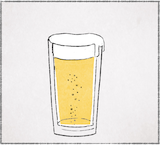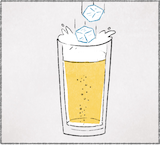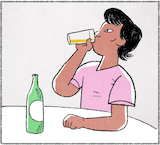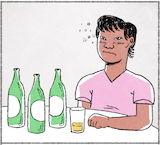



นี้คืออี่หยัง อันนี้คือแก้วเบีย
มีเบียอยู่ในแก้วนี้ มีเต็มแก้วเอาโลด
ขั้นกินเบียนี้ สิเฮ็ดให้เป็นหญัง สิเกิดอี่หยังขึ้น ขั้นคนกินหลายๆ หลือกินเบียเข้าไปหลายๆ มันกะสิเมา
ขั้นกินน้อยๆ มันกะบ่เมา ขั้นกินหลายคัก มันกะสิเมาคัก แล้วแต่คนที่คิดสิกิน
แล้วสีขาวๆ อยู่ในแก้ว หลืออยู่เทิงแก้วนั้น เขาเอิ้นว่าอี่หยัง เป็นฟอง มันเป็นฟองของเบีย
ขั้นเทเบียแฮง หลือเทแฮงๆ มันสิเป็นฟอง เกิดฟองจากเบียนี้หละ สิเฮ็ดให้เป็นฟอง แต่สามาดกะกินได้คือเก่า
แล้วเบียนี้ เด็กน้อยกินได้บ่ กินบ่ได้ เด็กน้อยๆ หนิกินบ่ได้ แต่ว่าขั้นเด็กน้อยที่ใหญ่พอสมควนกะกินได้ แต่ว่ากะบ่นิยมให้กิน พุใหญ่บ่อยากให้กิน แต่ว่าบางคนกะไปลักกิน หลือไปลักพ่อแม่กิน
7
เขากำลังเฮ็ดอี่หยัง เขากำลังเอาน้ำแข็ง กำลังสิเอาน้ำแข็งใส่ในแก้วเบียนั้น
เขาเอาใส่เฮ็ดหญัง ใส่ให้มันเกิดอี่หยังขึ้น เบียอันนี้อาดสิบ่เย็น อาดสิบ่มีความเย็นเลย เขากะเลยสิเอาน้ำแข็งใส่ เพื่อที่สิให้เบียแก้วนี้มันเย็น มันมีความเย็น
บางคนคิดว่า ขั้นกินเบียเย็นๆ มันกะสิแซบ ขั้นเบียมันบ่เย็น มันกะสิขม
8
เขากำลังเฮ็ดอี่หยัง เขากำลังกินอี่หยัง เขากำลังกินเบีย เขากำลังญกแก้วเบียขึ้นกิน
อยู่ข้างหน้าเขาตอนนี้มีอี่หยังแน่ กะสิมีโต่ะ แล้วกะมีขวดเบียพ้อม
เขานั่งอยู่เทิงโต่ะ เอามือวางไว้เทิงโต่ะ แล้วกะมีเบียวางอยู่เทิงโต่ะพ้อมขวดหนึ่ง
แล้วอยู่มือของเขา เขากะถือแก้วเบีย กำลังญกเบียกินพ้อม
9
เขาเป็นอี่หยัง เบิ่งซงแล้วเขาอาดสิเมา
เขากินเบียหลายๆ เขากะสิเมา เพาะว่าเบียมันเป็นแอ็นกอฮอ มันบ่ดี ขั้นกินหลายๆ มันกะสิเมา
เป็นหญังเขาคือเมา เบิ่งซงแล้วเป็นหญังเขาคือเมา เบิ่งแล้วเขากินเบียตั้งบักหลายขวด เขากินตั้งสามขวด เขาอาดสิเมา เพาะว่า เขากินเบียเข้าไปหลายๆ เขากะเลยสิเมา เบียนี้มันสิเฮ็ดให้คนเมา
Link to overview page
Link to dictionary
| Isaan | Pronunciation | Tones | Thai | English/Notes |
|---|---|---|---|---|
| นี้ | ni: | HF | นี้ | 1. this 2. here |
| คือ | khʉ: | HR | คือ | 1. to be, to resemble, like, as 2. why {บักหล้าคือบ่เก็บโต่ะแน่ = [addressing a young boy] Why haven't you cleared the table?} |
| อี่หยัง | i:-yaŋ | H-M | อะไร | 1. what {นี้คืออี่หยัง = What is this?} {มื้อนี้เจ้าเฮ็ดอี่หยัง = What are you doing today?} {กินเข้างายกับอี่หยัง = What did you have for breakfast?} 2. something, anything, (in negations) nothing {บ่ต้องเฮ็ดอี่หยังอีกเลยนอกจากใส่ปุย = [we] don't need to do anything besides adding fertilizer} |
| อัน | an | M | อัน | 1. thing, object 2. general clf. for objects |
| แก้ว | gɛ:o | HF | แก้ว | glass {ขวดแก้ว = glass bottle} |
| เบีย | bi:a | M | เบีย | beer |
| มี | mi: | HR | มี | 1. to have 2. there is |
| อยู่ | yu: | H | อยู่ | 1. to be (located) at 2. yet, still 3. auxiliary indicating continuous or progressive action {ทอดปาอยู่ในกะทะ = (in the process of) frying a fish in the pan} {แม่กำลังเมี้ยนเฮียนอยู่ = mother is cleaning/tidying up the house} |
| ใน | nai | HR | ใน | in, within |
| เต็ม | tem | M | เต็ม | full |
| เอาโลด | ao-lo:t | M-HF | เอาเลย, ทำเลย, จริงๆ | in final position: intensifier {โตส่ำกะทะเอาโลด = [a fish] as large as the pan!} {เกียบเต็มถ้วยเอาโลด = the bowl is almost full!} {ทะนาคานมันสิไปตั้งไว้อยู่ซู่หม้องเอาโลด = banks are everywhere!} |
| ขั้น | khan | LF | เมื่อ | when, if |
| กิน | gin | M | กิน | to eat, to consume, to use |
| สิ | si | M | จะ | future tense auxiliary {เขากำลังสิตื่น = he's about to wake up} {สิไปตะหลาด = [I'm] going to the market} |
| เฮ็ด | het | H | ทำ | to do, to make |
| ให้ | hai | LF | ให้ | 1. to give {หมอกำลังเอายาให้คนป่วยกิน = the doctor is giving the patient medicine} 2. for 3. to allow, to be allowed |
| เป็น | pen | M | เป็น | 1. to be, to exist 2. to be able to 3. to suffer, sth. happens to 4. เป็นหญัง[...]คือ in initial position: why? {เป็นหญังเขากะคือแปงฟัน = Why is he brushing his teeth?} {เป็นหญังเคี่ยงบินมันคือสิตก = Why is the airplane falling down?} |
| หญัง | ɲaŋ | M | อะไร, เป็นหญัง = ทำไม | 1. what {เขากำลังเฮ็ดหญัง = What is he doing?} {ธูปเอาไว้เฮ็ดหญัง = What are incense sticks for?} 2. something, anything, (nothing) 3. เป็นหญัง[...]คือ in initial position: why {เป็นหญังเขาคือใส่บักพิกลงไปในกวยเตียว = Why is he putting chili in [his] noodle soup?} {เป็นหญังหน้าต่างมันคือเปิด = Why is the window open?} {เป็นหญังมันคือมีควนไฟ = Why is there smoke?} |
| เกิด | gə:t | LF | เกิด | 1. (often together with ขึ้น) to happen, to arise, to take place {เกิดอี่หยังขึ้น = what is happening?} {บ่มีหญังเกิดขึ้น = nothing's happening} 2. to be born 3. to grow {หนวดกะคือสิเกิดอยู่ใต้ดัง = a moustache grows below the nose} |
| ขึ้น | khʉn | LF | ขึ้น | 1. to go up, to increase 2. sun: to rise {ตะเว็นกำลังขึ้น = the sun is rising} 3. more 4. bus/train etc.: to get on, to board {พุโดยสานขึ้นลดไฟเบิดแล้ว = all passengers have boarded the train} |
| คน | khon | HR | คน | person, people |
| หลาย | la:i | M | เยอะ, มาก | many, much, very |
| หลือ | lʉ: | M | หรือ | or |
| เข้า | khao | LF | เข้า | to enter, to go inside, to come/go in/on {เข้าห้องน้ำ = to go to the bathroom} {เข้านอน = to go to bed} {ขี่เลียเข้าไปเกาะ = to take a boat to go on an island} |
| ไป | pai | M | ไป | 1. to go 2. auxiliary indicating action extending into the future |
| มัน | man | HR | มัน | it (also used to refer to people) |
| กะ | ga | M | ก็ | 1. then, consequently 2. also |
| เมา | mao | HR | เมา | drunk |
| น้อย | nɔ:i | HF | น้อย | 1. few, little 2. small |
| บ่ | bɔ: | H | ไม่ | 1. no, not 2. question particle, transforming a statement into a question Notes: spelling exception in line with common usage on social media |
| คัก | khak | H | intensifier: very, very much | |
| แล้วแต่ | lɛ:o-tɛ: | HF-H | แล้วแต่ | up to, depending on |
| ที่ | thi: | H | ที่ | 1. that, which {คนที่ยืนอยู่ฝั่งขวา = the person which is standing on the right = the person standing on the right} {เว้าคำที่บ่สุพาบ = to speak words which are impolite = to speak impolitely} 2. for ordinal numbers {ที่สาม = third} |
| คิด | khit | H | คิด | 1. to think 2. to calculate {คิดเงิน = to calculate the price} |
| แล้ว | lɛ:o | HF | แล้ว | 1. finished 2. already 3. and then, and next (especially แล้วกะ) 4. auxiliary for past tense |
| สี | si: | M | สี | 1. color 2. colored pencil, crayon |
| ขาว | kha:o | M | ขาว | white |
| เทิง | thə:ŋ | HR | บน | 1. on, on top of, at, in {เทิงโต่ะ = at/on the table} {กบมันนั่งอยู่เทิงใบบัว = the frog is sitting on the lotus leaf} {เทิงท้องฟ้า = in the sky} {มันแล่นอยู่เทิงลาง = [the train] runs on rails} {มีคนนั่งอยู่เทิงลดสามล้อสามคน = there are three people sitting in the tuk tuk} 2. up, upward Notes: pronunciation: also realized as ทัง |
| นั้น | nan | HF | นั้น | that, there |
| เขา | khao | M | เขา | personal pronoun: he, she |
| เอิ้น | ə:n | HF | พูด, เรียก | to call, to say {เอิ้นง่ายๆ ว่า = in other words} {คนอี่สานเอิ้นว่า เป็นลูกคนกก = Isaan people call her ลูกคนกก} |
| ว่า | wa: | H | ว่า | 1. that, as {คำว่า X = the word X} 2. to say |
| ฟอง | fɔ:ŋ | HR | ฟอง | 1. bubble 2. foam (soap, beer) |
| ของ | khɔ:ŋ | M | ของ | of, belonging to |
| เท | the: | HR | เท | to pour {เทน้ำลงไปในแก้ว = to pour water into a glass} |
| แฮง | hɛ:ŋ | HR | แรง | 1. strong {ลมกำลังพัดแฮงอยู่ = to wind is blowing strongly} 2. loud {เสียงแฮง = loud} 3. strength, power |
| จาก | ja:k | LF | จาก | 1. from {... เฮ็ดมาจากอี่หยัง = ... is made from what?} 2. to depart |
| นี้หละ | ni:-la | HF-M | นี่แหละ | auxiliary for emphasis at the end of a phrase |
| แต่ | tɛ: | H | แต่ | 1. but {แต่บ่ต่างกันหลาย = but not very different} {แต่บ่ลู้ว่าเขาญ่างมาแต่ใส = but [I] don't know where he's coming from, see also: แต่ว่า} 2. only {ตอนนี้มีแต่ขี้ฝ้า = now there are only clouds} |
| สามาด | sa:-ma:t | M-HF | สามารถ | can, to be able |
| ได้ | dai | HF | ได้ | 1. can 2. to get, to obtain 3. before verb: indicating past tense 4. บ่ได้ + verb: not |
| คือเก่า | khʉ:-gao | HR-H | as before | |
| เด็กน้อย | dek-nɔ:i | M-HF | เด็ก, เด็กน้อย | child |
| หนิ | ni | M | นี่แหละ, เหรอ/หรอ | 1. particle used to emphasize a statement or form (or add to) a question {เป็นตาแซบคือหญังหนิ = it's really tasty} {เคี่ยงพอเท่าๆ หนิ = the [radio] is appropriately sized (i.e., not too large)} 2. variant of นี้ = this Notes: translation to be determined; maybe sometimes like Thai นี่แหละ; other examples given: อยู่ใสหนิ อยู่ตลาดหนิ กินเข้าไป่หนิ |
| แต่ว่า | tɛ:-wa: | H-H | แต่ว่า | 1. but 2. only {ฮู้แต่ว่าเขายืนอยู่พุเดียว = I only know that he's standing there by himself} |
| ใหญ่ | ɲai | H | ใหญ่ | large, big |
| พอสมควน | phɔ:-som-khu:an | HR-M-HR | พอสมควร | moderately, fairly, rather |
| นิยม | ni-yom | H-M | นิยม | 1. to be popular 2. to prefer {คนสะหมัยนี้นิยมกาน... = nowadays, the people prefer to ...} |
| พุใหญ่ | phu-ɲai | H-H | ผู้ใหญ่ | adult, elder |
| อยาก | ya:k | LF | อยาก | to want, to wish |
| บาง | ba:ŋ | M | บาง | 1. some {สัดบางโตบ่มีขา = some animals don't have legs} {บางคนสิมักกินกวยเตียวแทนเข้า = some people like to eat noodle soup instead of rice (dishes)} {บางสิ่งบางอย่าง = something, anything} 2. thin |
| ลัก | lak | H | ลัก | to steal |
| พ่อ | phɔ: | H | พ่อ | father |
| แม่ | mɛ: | H | แม่ | mother |
| กำลัง | gam-laŋ | M-HR | กำลัง | auxiliary indicating continuous or progressive action |
| เอา | ao | M | เอา | to take, to give {เขากำลังเอาก่องไปซั่ง = he's taking the boxes to weigh them} {หมอกำลังเอายาให้คนป่วยกิน = the doctor is giving medicine to the patient} {เอาไว้ถ้า = is for, is used for, has the purpose of} |
| น้ำแข็ง | na:m-khɛŋ | HF-M | น้ำแข็ง | ice |
| ใส่ | sai | H | ใส่ | 1. to put something in/on {เขาใส่บักพิกในกวยเตียวหลาย = he's putting a lot of chili in his noodle soup} {เขาบีบยาสีฟันใส่แปงสีฟัน = he squeezes toothpaste on the toothbrush} {ก่องเอาไว้ใส่ของ = boxes are there to put stuff in} 2. to wear (clothes) {เขาใส่เสี้ยแขนญาว = he's wearing a long-sleeve} 3. directed at {เอิ้นใส่กัน = to call each other/to say to each other} {หมามันเห่าใส่แมว = the dog barks at the cat} {ล้องเพงใส่ไม = to sing into the microphone} {เขากำลังซี้มือไปใส่พุซาย = she's pointing at the man} |
| อาด | a:t | LF | อาจ | 1. might, may, will 2. likely |
| เย็น | yen | M | เย็น | cold, cool (air, objects) |
| ความเย็น | khwa:m-yen | HR-M | ความเย็น | coldness, coolness |
| เลย | lə:i | HR | เลย | 1. futher on, beyond, past {เข็มน้อยเลยเลขสิบสองไป = the minute hand has passed number twelve} 2. too much 3. at all 4. definitively 5. completely, utterly |
| เพื่อที่ | phʉ:a-thi: | H-H | เพื่อที่ | in order to, so that Notes: the vowel เอือ is likely to be a Thai loan |
| แซบ | sɛ:p | HF | อร่อย | 1. food: tasty {กวยเตียวมันแซบบ่ = Is the noodle soup tasty?} 2. sleep: well {เป็นตานอนแซบคัก = it looks as if she's sleeping very well} |
| ขม | khom | M | ขม | bitter |
| ญก | ɲok | H | ยก | 1. to raise {ญกมือขึ้น = to raise the hand} {ญกโตอย่าง = to give an example} 2. to lift {เขากำลังญกก้อนหินขึ้น = he's lifting up the stone} |
| ข้างหน้า | kha:ŋ-na: | LF-LF | ข้างหน้า | in front, forward |
| ตอนนี้ | tɔ:n-ni: | M-HF | ตอนนี้ | now |
| แน่ | nɛ: | H | แน่, บ้าง | 1. some, somewhat 2. final particle, used to ask for examples (similar to Thai บ้าง at the end of a question) {หม้อใซ้เฮ็ดอี่หยังได้แน่ = What (different things) can a pot be used for?} {น้ำอัดลมซื้อได้อยู่ใสแน่ = Where/in which places can one buy soft drinks?} 3. final particle, when giving examples {มีเทิงส้งแน่ มีเสี้ยแน่ มีเกิบแน่ = there are trousers, shirts, shoes etc.} 4. final particle, used to give a command {ไปปิดหน้าต่างให้แน่ = Close the window!} 5. final particle, acting as an intensifier, especially in the pattern ... คัก ... แน่ {สูงคักสูงแน่ = very high} {ญ้องเฮาคัก ญ้องเฮาแน่ = [he's] praising me a lot} |
| โต่ะ | to | H | โต๊ะ, เก้าอี้ | 1. table 2. chair |
| ขวด | khu:at | LF | ขวด | bottle |
| พ้อม | phɔ:m | HF | พร้อม | at the same time, also, too {มีตะเว็นพ้อม = the sun's out, too} {กะทะมีด้ามพ้อม = the pan has also a handle} |
| นั่ง | naŋ | H | นั่ง | to sit |
| มือ | mʉ: | HR | มือ | 1. hand 2. front leg/paw (e.g., of a cat) |
| วาง | wa:ŋ | HR | วาง | to place, to set/put down {โทละสับ/phone: วางสาย = to hang up} {มีเกิบวางอยู่ในก่อง = there are shoes in the box} {มือข้างหนึ่งเขาวางอยู่เทิงโต่ะ = he's put one of his hands on the table} |
| ไว้ | wai | HF | ไว้ | 1. to keep, to put, to place, to retain, to save, to reserve {เขาเอาหัวของเขาไว้ใส = Where does she put her head?} {หมาสิเลี้ยงไว้บ้าน = dogs are kept/raised in the house} {ไก่เลี้ยงไว้ในคอก = chicken are kept/raised in a coop} {หน้ามันบังไว้ = the face is covered/not visible} {เขาเอาโทละสับวางไว้หู = he holds the phone to his ear} 2. for {นาลิกาปุกมีไว้เฮ็ดหญัง = What is an alarm clock for?} {หม้อเอาไว้เฮ็ดแนวกิน = a pot is used to make food} {ก่องเอาไว้เฮ็ดหญัง ก่องเอาไว้ใส่ของ = What is the box for? It's for putting in stuff.} Notes: see also ไว้ถ้า |
| หนึ่ง | nʉŋ | H | หนึ่ง | 1. one 2. after adjective: intensifier {บักคักหนึ่ง = very much} {อันบักใหญ่หนึ่ง = very large}, or attenuates the meaning {กะดาดมันแผ่นน้อยๆ หนึ่ง = the piece of paper is [relatively] small} |
| ถือ | thʉ: | M | ถือ | 1. to hold 2. to carry 3. to regard as, to consider {สี่สิบองสาถือว่าฮ้อน = 40 degrees Celsius is considered hot} |
| เบิ่ง | bəŋ | H | ดู | 1. to look at, to see, to watch {เบิ่งโทละทัด = to watch TV} {เบิ่งหนัง = to watch a movie} 2. to guess {เบิ่งซงแล้ว ... = [I] guess / from what it looks like ...} |
| ซง | soŋ | HR | ทรง | 1. shape, form 2. as if, like Notes: translation to be confirmed |
| เพาะว่า | phɔ-wa: | H-H | เพราะว่า | because |
| แอ็นกอฮอ | ɛn-gɔ:-hɔ: | M-M-HR | แอลกอฮอล์ | alcohol |
| ดี | di: | M | ดี | good |
| ตั้ง | taŋ | HF | ตั้ง | as much as, up to {เขากินตั้งสามขวด = he's drunk as much as three bottles} |
| บัก | bak | M | 1. intensifier before adjectives {ปาโตบักใหญ่ = a (very) large fish} 2. prefix in front of fruits and vegetables {บักแตงโม = watermelon} 3. can be used as a reference for a male person of the same or younger age {บักอันนี้ = this lad} |
|
| สาม | sa:m | M | สาม | three |